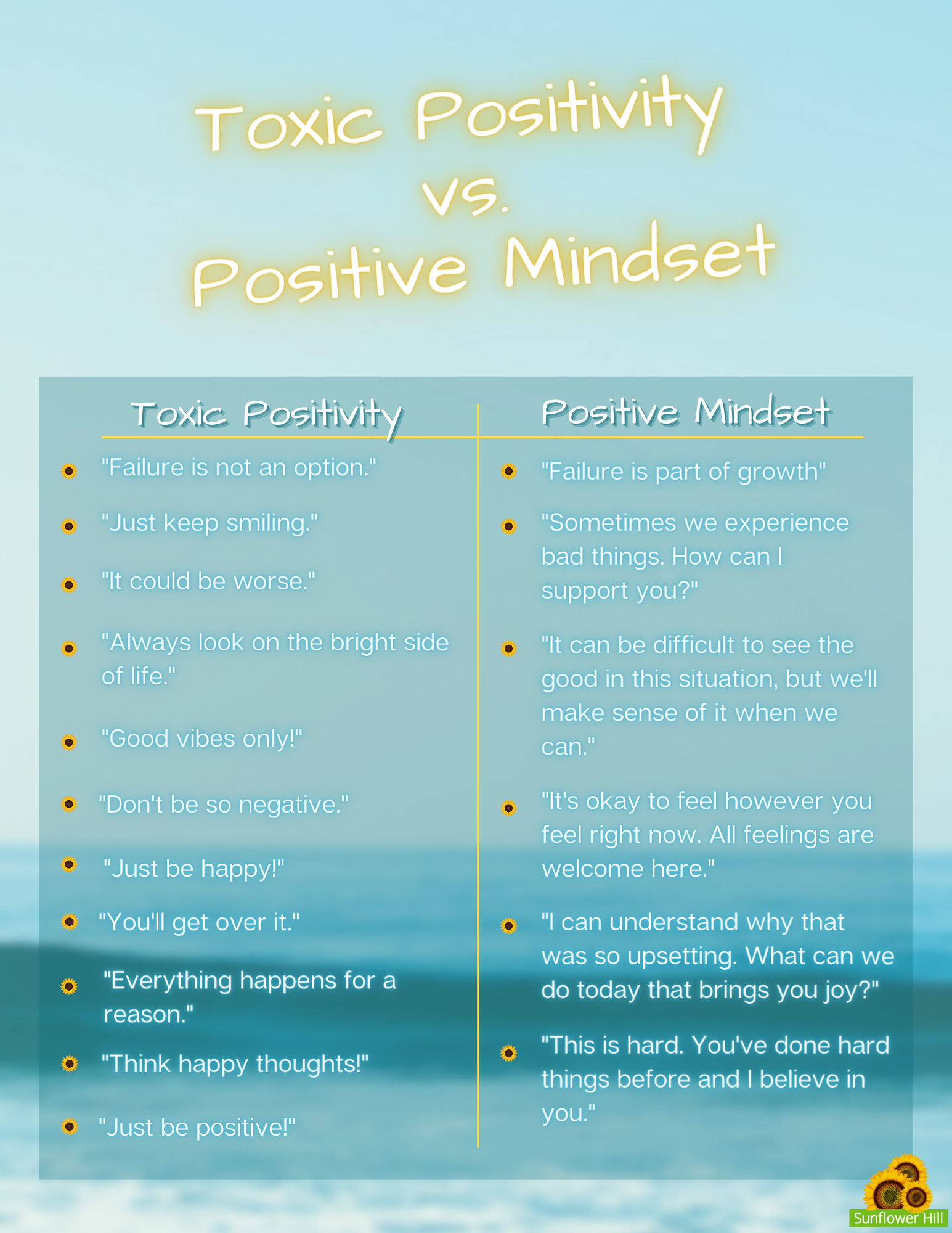Toxic Positivity
October 13, 2021

Can positivity be toxic? What does that even mean?
I recently learned in my Master’s Program that positivity can sometimes be toxic! I was surprised to learn that there is such a thing as Toxic Positivity.
Believing that people should put a positive spin on all of their emotions and experiences, even when those emotions and experiences are terrible, is called Toxic Positivity. Toxic Positivity can make people feel that the emotions they are experiencing are unacceptable.
Have you ever been sad, frustrated, or angry and had someone say to you, “just think happy thoughts”, or “it’s just a phase”, or “everything will be OK”? I have! When I’m feeling sad, frustrated or angry, I don’t want to hear things like “just smile” or “think happy thoughts”. In that moment, I’m feeling a strong emotion and the other person’s comment makes me feel like I shouldn’t feel that way.
You may think: they’re just trying to help – what’s so wrong with being positive?
Toxic Positivity
 When we continuously tell ourselves, “good vibes only”, or “it is what it is”, or “smile and you will be fine”, we are disregarding the natural negative emotions that we experience. Everyone gets sad, angry, anxious, frustrated, jealous, and depressed. It’s okay to feel these emotions – they are just as essential to being healthy as feeling happy, excited, motivated, refreshed. Feeling emotions is part of what makes us human.
When we continuously tell ourselves, “good vibes only”, or “it is what it is”, or “smile and you will be fine”, we are disregarding the natural negative emotions that we experience. Everyone gets sad, angry, anxious, frustrated, jealous, and depressed. It’s okay to feel these emotions – they are just as essential to being healthy as feeling happy, excited, motivated, refreshed. Feeling emotions is part of what makes us human.
Positive Mindset with Family & Friends
Focusing on optimism or a Positive Mindset offers a different approach to being emotionally healthy and avoiding Toxic Positivity. Optimism is a “feeling of hopefulness and confidence about the future or the successful outcome of something.” Having a Positive Mindset allows us to feel sad, angry, or anxious, but still be optimistic that we won’t always feel that way – that there is hope.
We all experience feeling angry, sad, or anxious. How many times have you played the part of a therapist with a close friend or family member by listening and trying to help them feel better? Focusing on a Positive Mindset is a healthy way to help a friend or family member. If you choose to help someone, it’s best to make sure that you listen to the person and understand the full context of their emotions. Acknowledge and validate their emotions so that they can express what they are feeling and not just cover up what they are feeling in that moment. Part of being human is feeling the full range of emotions. We might feel jealous when our friend wins a game and we don’t. Or, we might have a moment when we feel unmotivated to get up and go to work or school. It’s very normal!
Toxic Positivity can invalidate how people feel by indirectly telling the person that what they are feeling or experiencing is wrong. This can result in them feeling ashamed, isolated, and less likely to share their feelings again. They may try to keep their feelings hidden. Stress from repressed feelings can start to affect physical health, and make a person feel constantly tired, more likely to get sick, and become depressed.
If we can’t tell people to “just be happy”, how do we help? Let’s say a friend shares with you that they are feeling sad and frustrated. You could start the conversation by saying:
How are you feeling? I’m listening.
Once you’ve asked the question, you don’t have to say anything. Just listen. This shows the person that you are paying attention to what they are saying and providing a safe and non-judgmental space for them to share their feelings. After they have shared their feelings, you may want to say, “I can see that you are really stressed (or anxious, angry, etc.) What can I do to help?” Doing so acknowledges and validates what they are feeling.
 Here are a few additional things to say to show people you are listening and acknowledge and validate their emotions.
Here are a few additional things to say to show people you are listening and acknowledge and validate their emotions.
Important Conversation Reminders
When talking with a friend or family member, here are a few important reminders:
- Give the person your full attention by:
- Facing them
- Putting your phone away or down
- If the TV or music is on, turning it off
- Holding their hand (if they are okay with it)
- Don’t laugh or make jokes when someone is sharing their feelings
- Avoid saying, “you know other people have it worse” or, “If I can do it, so can you.”
- Remember that situations may affect each person differently. Something that may be a piece of cake for you, could be devastating or seem impossible for the other person.
- Show them you are listening by confirming what they said. You can say:
- “I hear that you are feeling very anxious because you are______.”
- “Tell me why ____ makes you feel _____. I’m listening.”
- If you have ever felt a similar way to how the person is feeling, share very small details about how you were able to feel more optimistic. By doing this, you may guide them to come to a solution for themselves.
Remember that you don’t have to solve their problem. The most important part is to listen to the person and acknowledge and validate their emotions!
Inspired by this article? Donate today!
Story by: Pratimajit Kaur, Sunflower Hill at Irby Ranch Residential Programs Manager
Contributing Writer: Rachel Clark, Sunflower Hill Communications Manager
